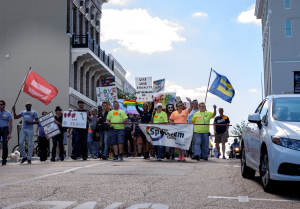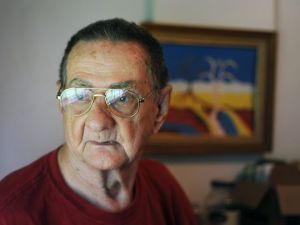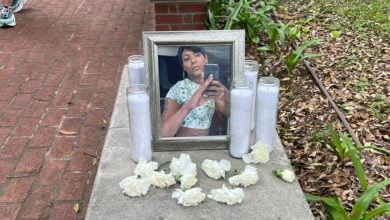
“We are all different from one another, and that diversity should be celebrated because that is where our unity comes from, not in conformity,” said local Brandiilynne Dear, who had a romantic relationship with another girl as an adolescent. Later, when her feelings for women became known, the local newspaper ran a story that she was an abomination despite having a growing ministry in her church.
Now the triumph of the first ever LGBTQ pride event in Hattiesburg, Miss., has thrown more dirt on the grave of that bigoted past, adding another victory for the community as people also fight to enforce their legal rights to enter into a same-sex marriage based on the U.S. Supreme Court decision earlier this year.
Hattiesburg, Miss., Inaugural Pride—called Southern Fried Pride—took place on Oct. 10, which has been known historically as national “Coming Out” weekend (specifically Oct. 11 is Coming Out Day). It was the first safe and public act of LGBTQ people in southern Mississippi to come together, sharing struggles and triumphs, vowing to never go back in the closet again.
Participants came from all over the Gulf Coast for multiple community, religious and health-related events for the LGBTQ community. Health issues and sexual health were a priority, including for transgender health needs, as the decades of bigotry have created numerous health disparities in the LGBTQ community in the region.
A dozen or so bigots, now clearly outnumbered by the decades-long struggle of the people, protested on the sidelines of Southern Fried Pride with racist symbols of the confederacy and the KKK.
Decades of long struggle and sacrifice locally set the stage for a pride event in this part of the country that historically has been isolating–to say the least–for the LGBTQ community.
Despite the looming repression—just 30 minutes from Hattiesburg in Ovett, Miss.,–was a center of LGBTQ organizing at Camp Sister Spirit. Founded by Wanda and Brenda Henson in 1993, Camp Sister Spirit provided a retreat space for feminist, lesbian and other progressive organizing in the area—the camp was called by many the “Stonewall of the South.” The camp volunteers also were responders to people in need in the wake of Hurricane Katrina in 2005 and many other initiatives in the service of the people that the southern part of Mississippi.
Wanda and Brenda fought back in the face of extreme threats and violence including death threats, hate mail and gun fire late at night. In the early 1990s, Brenda was chased home by bigots and driven off the road. Another time when they ordered gravel for their driveway, the gravel company refused to deliver after receiving threats that the gravel trucks would be burned. A bigoted billboard was placed by an armed militia on neighboring property demonizing the camp.
Wanda and Brenda always had an open door policy to any force carrying out organizing work in the area—including hosting Party for Socialism and Liberation members during an outreach trip in Mississippi.
“We do not seek tolerance and acceptance. We seek freedom from oppression, intimidation and harassment. We seek justice and a legal system that is capable and willing to defend our rights,” said Brenda and Wanda Henson. Brenda died at the age of 62 in 2008 and the camp has since closed, but the heroic efforts of this lesbian couple drew national attention against bigotry and it is to their credit that nearby Hattiesburg marches proudly in the streets today.

Bold initiatives against racism and LGBTQ oppression in Mississippi date much earlier. Eddie Sandifer, a gay activist from Jackson, Miss., was an early member of the Mattachine Society. In 1958, Sandifer and other organizers from the Mattachine Society threatened to protest in front of a New York City hotel that refused to allow Black members to stay at the hotel for the first gay organization’s national convention. The hotel management quickly changed their racist policy to avoid the protest.
Sandifer spent a lifetime as a militant, anti-racist gay activist who was a consistent friend of the socialist movement and early Civil Rights Movement. In the 1970s, Sandifer lead the Mississippi Gay Alliance and in the 1980s and afterwards, he worked to house people with AIDS.
Southern Fried Pride is not just another pride event, but an accomplishment from decades of struggle from some of the most dedicated fighters in the LGBTQ movement.






